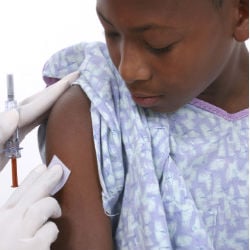
On immunizing your child—a social responsibility
19 June 2012
By Dr. Richard Haber
Last year we had an outbreak of measles in Quebec. Although measles had been eradicated, 760 cases surfaced. It was thought to have sparked from a general distrust of immunization. Yet, I would maintain that immunization—along with clean air, clean water, and good housing—has done more to save lives than anything else that doctors have ever done.
Before vaccines, the simple fact was many people died due to infectious diseases. When the efficacy of vaccines became established, governments around the world rushed made vaccines available to the populace , making it compulsory in many cases. As immunizations for childhood diseases were developed, including diphtheria, measles, mumps and rubella, vaccination became required for public school attendance in some countries. By 1974, the WHO launched the Expanded Programme on Immunization. Through their efforts the last naturally occurring case of smallpox in the world occurred in Somalia in 1977.
Governmental entities strive to immunize as many people as possible in order to reach “herd immunity”. Herd immunity takes place when enough people are vaccinated to substantially lower the likelihood that a susceptible person will come into contact with an infected person.
Vaccination then, becomes a social responsibility. Getting vaccinated protects the individual but it also protects the community.
Unfortunately, over the years there have been health scares related to vaccination. The most recent following the publication of a paper in the medical journal The Lancet in 1998, which presented apparent evidence that autism spectrum disorders could be caused by the MMR vaccine, an immunization against measles, mumps and rubella. A 2011 journal article described the vaccine-autism connection as “the most damaging medical hoax of the last 100 years.”
Thankfully, investigations by Sunday Times journalist Brian Deer revealed that the lead author of the article, Andrew Wakefield, had multiple undeclared conflicts of interest, had manipulated evidence, and had broken other ethical codes. The research was declared fraudulent in 2011 and Wakefield was no longer allowed to practice medicine. Ultimately, no evidence linked the vaccine to the development of autism and the vaccine’s benefits proved to greatly outweigh any risks.
However, the damage had already been done. Vaccination rates in the UK and Ireland dropped sharply, which in turn led to greatly increased incidence of measles and mumps, resulting in deaths and severe and permanent injuries. The 2000 Irish outbreak saw 1,500 cases of measles and three deaths. Other countries were also influenced by his paper, which, combined with some complacency, led to vaccination rates dropping and cases of measles rising. France in particular, had been hard hit by recent measles outbreaks. According to the World Health Organization, there were more than 14,000 cases reported in the first six months of 2011. Six of those cases were fatal. Health officials have said the re-emergence of measles in Canada has been traced back to travelers who returned with the disease after visiting France.
The fact is vaccine prevention is only as good as the herd immunity. Take the flu vaccination, for example. By having your toddler immunized you could prevent some other person, elderly or with immune-compromised health, from death.
Vaccines work by preparing a child’s body to fight illness. Each immunization contains either a dead or a weakened virus or bacteria (or parts of it) that causes a particular disease. The body practices fighting the disease by making antibodies that recognize specific parts of that germ. This permanent or longstanding response means that if someone is ever exposed to the actual disease, the antibodies are already in place and the body knows how to combat it and the person doesn’t get sick. This is called immunity.
A common question is will the immunization give someone the very disease it’s supposed to prevent? The answer is, it impossible to get the disease from any vaccine made with dead (killed) bacteria or viruses or just part of the bacteria or virus. Overall, vaccines have improved the lives of billions of people worldwide, eradicating many diseases or reducing them to small, manageable outbreaks.
My message is: you should immunize your child and if there are any issues then you should discuss them with your physician. In general, however, it is a very important public health policy that helps protects all of us.
Please help save lives—just say yes.
